10 December 2024, Havana to Santiago de Cuba
Viazul bus
11 December 2024, Santiago de Cuba
Hostal Castillo, $23 (R419)We have spent our first two nights in Cuba at the charming and well-run La Mansion del Centro. This afternoon we board a Viazul bus, a government-owned long-distance service, bound for Santiago de Cuba 17 hours east of Havana. After two nights there, we get on the bikes…
--
Yola, our Havana host, grew up with her mom in a small two-bedroom house. When she went away to college to study information sciences in 2001, her mom let out her room to tourists.
Cuba began encouraging tourist dollars in the late-1990s, allowing the private sector to participate in the process. Casa Particulars, essentially rooms in family homes, seem to have sprung up overnight. In 2006, Yola’s mom moved to a bigger house and Yola joined her in the tourism business. In 2014, Yola moved to her current location where she has four rooms to let and where she lives on site.
Her unobtrusive street door leads up a long flight of stairs to her level on the first floor which comprises her apartment, the four rental rooms, a large kitchen for her use and from which she serves guests delicious coffee and (expensive) breakfast if you want it, and a central courtyard open to the sky. Her good-looking, tall, young, strong neighbour is roped in periodically to lug guests’ luggage up the stairs and was on standby to assist us when we arrived from the airport.
--
Tourism, is virtually the only source of hard currency in Cuba, the Cuban peso not being accepted anywhere. Covid, or should I say governments’ response to Covid, all but killed Cuba’s tourist industry, which has yet to recover. The Cuban government, desperate for foreign currency, opened shops called MLC shops at which only foreign currency was accepted. Those who had earned USD, Canadian and Euro, and those in receipt of funds from overseas family members, could shop here during Covid, providing them with goodies and the state with useable currencies. The poor simply suffered from more-than-usual shortages.
The (increased) economic hardship of the last several years has meant government has been unable, for example, to effect repairs to pavements which are in a tripping state, and that the electricity grid is in trouble. Blackouts are common; in Havana there is a known schedule, apparently in other parts of the country these occur more randomly and for longer periods. Yesterday there was no electricity from 1500 to 1900; today from 1000 to 1500.
My brother tells me that Canadian tour companies are cancelling tour groups due to the blackouts. A vicious cycle with no end in sight…
--
On arrival, Yola took away our passports to register us, having to do so online, checking our photos against those taken at the airport. Big brother keeping an eye on us…
--
17 hours on the bus brought us to Santiago de Cuba during yet another blackout. Will cold shower and nap now and write more later...
--
Bus report
On the whole, our Viazul bus experience was positive. The online booking system was user-friendly, the check-in and boarding well-organised.
We had read that seats on Viazul buses are unreserved and that one should board at the front of the queue to find (a) a functional seat that stays upright when desired and reclines when preferred and (b) a seat behind a functional seat so one does not end up with a seat reclined into one’s lap throughout the journey. We had also read that though one cannot reserve space for bikes in the hold, for a fee these can be transported. The former proved untrue, the latter spot on. The seats were reserved, all seemed functional, and the bikes were easily onboarded for 15 euro each.
17 hours is a very long time to spend on a bus, even one that allows for a dinner break of 45 minutes and several shorter loo / snack breaks at bigger stops.
The public loos are, perhaps not surprisingly, in poor condition, some cleaner than others. No loo seats, no loo paper (locals bring their own), broken flush mechanisms, sometimes no water at all. Despite which you are billed a small user fee!
The aircon on the bus was on full blast making for an icy ride and a shock to the system deboarding in a very hot and humid Santiago de Cuba.
But generally we were happy with the service and relative comfort of the seats and the space for on-bus luggage (when you check-in, you are told which bags to take inside and which to place in the hold, and these latter are tagged a la air travel…)
--
It is not entirely surprising that Cuba is poor* and that tourists are a target for those in need of additional cash. As a general rule, our tight travel budget does not allow for donations to the indigent in foreign lands, though on rare occasions we make an exception.
I was oblivious late-morning, after 17 hours on a freezing bus and 30 minutes in unbearable heat and humidity, of an “entrepreneur” taking advantage of our need for a meal. He inserted himself into our dealings with the restauranteur and took over the translation activity, food service and cash taking. Once we had paid and he had undoubtedly received a cut of the undoubtedly higher-than-actual bill, he removed himself and his backpack from the premises. Lesson learned.
This evening, on a much sadder note, we were approached by a scrawny professor of geography, much older looking than his 71 years, who was desperate for a donation. It was hard to say no, though we did, largely because we had bigger notes on us than he asked for and we were willing to part with.
--
No-one comes to Cuba for a positive gastronomic experience. Probably the beach resorts, catering exclusively to the tour group tourists, serve excellent meals. So far, though we have had one or two tasty experiences, our food has been mediocre.
Last night, our bus stopped at a roadside place that served chicken or pork with rice, shredded cabbage, a slice of roasted sweet potato and drooping green beans for dinner. Tasty enough, and filling, but not something you would go back for a second time. At a brief stop to drop off and collect travellers, an enterprising young woman called to passengers from beyond the terminus fence, hawking good buns filled with white cheese, ham and lettuce.
Tonight, a couple of restaurants we passed were closed early, at one an exiting customer or staff member indicating that they were out of food. We settled for toasted sarmies at a pretty little place with good aircon, sitting out a sudden downpour over our cappucinos.
Charl says that how we experience food is entirely a product of our hunger. Guess we have not been too hungry, then...
BTW, for our last breakfast in Havana, Charl was given “packaging” for what he bought: strips torn from old computer printer paper, the kind with holes along the edges.
*$7449 GDP per capita per annum; in 2021 ie post-Covid, most sectors were finally opened to the private sector; still 65% of the populace are government employees, and just 35% not.
DID YOU KNOW that when you book a government-run long distance bus online, you will need first, at their request, to install a VPN?
A VPN is intended to hide your location and protect your data from the state.
Go figure!
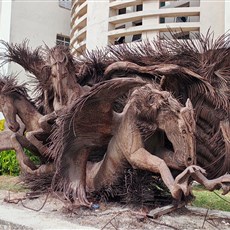
Havana en route bus station
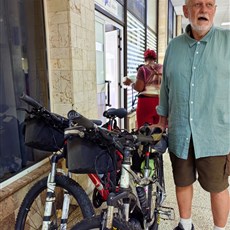
En route Santiago de Cuba
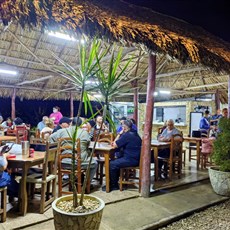
En route Santiago de Cuba
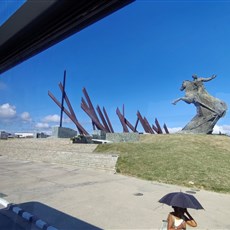
Arriving Santiago de Cuba
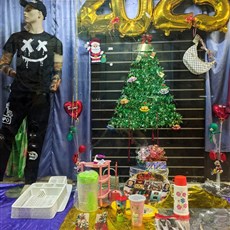
Santiago de Cuba - Xmas display